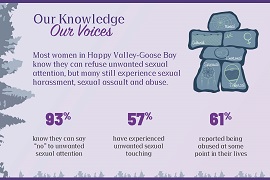Our Knowledge, Our Voices Postcard Series
The CVI Project in Partnership with Violence Prevention Labrador
Violence against women1 is a pervasive and persistent problem, but too often it is an invisible problem. In family and community conversations, silence hangs over this topic, even though it touches the lives of most women and people who care about women.2 The reasons for this are complex, but stigma and backlash are among the reasons women do not speak out.3 Both the likelihood of experiencing violence and the risks of speaking out are intensified for women experiencing multiple forms of structural marginalization, especially disabled women, LGBTQ+ people, women, young women, and Indigenous women.4 The fact that violence against women most often occurs in private settings – “behind closed doors” – also contributes to its invisibility. With the loss of social supports and stay-at-home orders, the increase in violence directed towards women and girls during the COVID-19 pandemic has been called a “shadow pandemic” by researchers and advocates.5
Violence Prevention Labrador (VPL) is the Regional Coordinating Committee against Violence for the Labrador region, which falls under the province’s Violence Prevention Initiative. VPL partners with like-minded organizations and community groups to help find long term solutions to the problem of violence against those most at risk in our society - women, children, Indigenous women and children, seniors, youth, persons with disabilities and other vulnerable people who are victims of violence because of race, ethnicity, sexual orientation or economic status.
The Our Knowledge, Our Voices Postcard series, created in collaboration with VPL, is part of an effort to make visible interrelated dimensions of wellbeing that affect diverse women in Happy Valley-Goose Bay. The postcard series highlights local data on experiences of violence against women, but also community connections and knowledge that can help to counter violence and related stigma. The data used in this postcard series come from the results of a survey that was developed and shared in 2018 through collaboration between diverse women-identifying people in Happy Valley-Goose Bay, and partners at the University of Guelph and the Labrador Institute. Inuit and settler women have been involved in all stages of the research.
We hope you will use and share the postcards to help spark conversations about better understanding and addressing violence against women in Happy Valley-Goose Bay and Labrador, conversations that help us imagine a future where experiences of violence against women, are the exception and not the norm.
~ Written by Dr. Laura Pin and Dr. Leah Levac
View the Our Knowledge, Our Voices Postcards.
Learn more about Violence Prevention Labrador’s work and the Community Vitality Index Project on their websites.
Resources:
1 We use “women” inclusive of both cis- and trans- women-identifying people.
2 Cotter, Adam and Savage, Laura. 2018. Gender-based violence and unwanted sexual behaviour in Canada, 2018: Initial findings from the Survey of Safety in Public and Private Spaces. Statistics Canada. https://www150.statcan.gc.ca/n1/pub/85-002-x/2019001/article/00017-eng.htm?fbclid=IwAR1gS_HeNSGY8t_udwMM0V4JSnFxdQPDi0rSwl1YKtPPl-Dizx78rMQvKF4; Jaffray, Brianna. 2020.
3 Miller, A. K., Canales, E. J., Amacker, A. M., Backstrom, T. L., & Gidycz, C. A. (2011). Stigma-threat motivated nondisclosure of sexual assault and sexual revictimization: A prospective analysis. Psychology of Women Quarterly, 35(1), 119-128; Mansbridge, J., & Shames, S. L. (2008). Toward a theory of backlash: Dynamic resistance and the central role of power. Politics & Gender, 4(4), 623.
4 Experiences of violent victimization and unwanted sexual behaviours among gay, lesbian, bisexual and other sexual minority people, and the transgender population, in Canada, 2018. Statistics Canada. https://www150.statcan.gc.ca/n1/pub/85-002-x/2020001/article/00009-eng.htm?fbclid=IwAR2B9B1VvQdS_TxmNAjBnV1xoXBFd-RVGCOUxL7P1HjO5bW-POjvGDj-b5Y; Hargreaves, A. (2017). Violence against Indigenous women: Literature, activism, resistance. Wilfrid Laurier Univ. Press. Brownridge, D. A. (2006). Partner violence against women with disabilities: Prevalence, risk, and explanations. Violence against women, 12(9), 805-822.
5 Peterman, A., Potts, A., O'Donnell, M., Thompson, K., Shah, N., Oertelt-Prigione, S., & Van Gelder, N. (2020). Pandemics and violence against women and children (Vol. 528). Washington, DC: Center for Global Development. https://www.cgdev.org/sites/default/files/pandemics-and-vawg-april2.pdf


